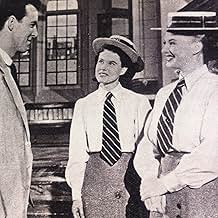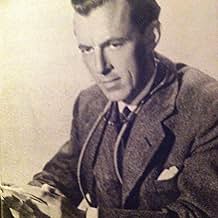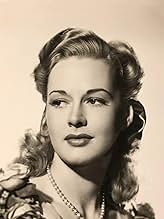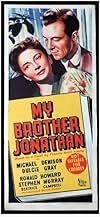Ajouter une intrigue dans votre langueMedical student Jonathan Dakers sacrifices his career to fund brother Harold's education. Harold and Edie fall in love but Harold dies in WWI leaving Edie pregnant. After Edie's death in chi... Tout lireMedical student Jonathan Dakers sacrifices his career to fund brother Harold's education. Harold and Edie fall in love but Harold dies in WWI leaving Edie pregnant. After Edie's death in childbirth, Jonathan raises their son Tony.Medical student Jonathan Dakers sacrifices his career to fund brother Harold's education. Harold and Edie fall in love but Harold dies in WWI leaving Edie pregnant. After Edie's death in childbirth, Jonathan raises their son Tony.
- Director
- Writers
- Stars
- Eugene Dakers
- (as J. Robertson-Justice)
- Tony Dakers
- (as Peter Murray)
- Mr. Martyn
- (as R. Stuart Lindsell)
Avis en vedette
We return to the death of his father (in a car accident). It is revealed that the father had misspent Jonathan's inheritance (which was in trust). Jonathan promises his brother Harold that he will still be able to finish his degree at Cambridge University.
He buys a share in Dr. Hammond's general practice in Wednesford, a poor foundry town in the north. He maintains a relationship with Edie, writing to her as she winters in Monte Carlo on the French Riviera. The local cottage hospital refuses him permission to bring his patients there and as he is not a Fellow of the Royal College of Surgeons also refuse him permission to operate.
Harold tells Jonathan that he loves Edie and is going to marry her. They celebrate together on New Year's Eve 1913/14. Jonathan moves his affections from Edie to Rachel, his assistant. Harold (Hal) joins up at the start of the First World War. He is killed leaving Edie pregnant but unmarried so Jonathan returns to her and marries her to preserve respectability.
When Dakers notes that many patients have been injured in industrial accidents at the foundry, he comes into conflict with its owner Sir Joseph Higgins, and the owner's son-in-law Dr. Craig, who owns the town's competing medical practice. He writes a report criticising the condition of the foundry and buildings the workers live in but Craig, who is also the local Health Officer, deliberately mislays it.
When Dakers performs a life saving tracheotomy on a child with diphtheria, and takes the child to the cottage hospital, he is charged with misconduct, as the hospital charter precludes infectious cases. He is asked to attend a medical tribunal. Jonathan explains he had no choice in order to save the child. He is charged with not reporting a case of diphtheria and operating without permission. Dakers publicly accuses the medical authorities of suppressing health issues in the town and not serving the town. Dakers suggests public subscription to support medical treatment of the poor. The public are very much behind Dakers.
They decide to change the operation of the hospital. The corrupt officials (Higgins and Dr. Craig) resign. As the meeting concludes a siren sounds... there is a big fire at one of the foundries. Craig is injured and Jonathan operates on him and saves his life.
Dr. Hammond meanwhile serves at the birth of Edie's son. However Edie dies soon after, first telling Jonathan to be happy with Rachel.
The story jumps to 1939. Jonathan and Rachel are married. Edie's son is fully grown and in army uniform.
So "My Brother Jonathan" is really the fallen brother's story and view of his brother the doctor, who is eloquently played by Michael Denison in a sustained and gripping performance throughout the film. It has been called Dickensian, and there is indeed a touch of the warm humanity of Dickens colouring this exquisite masterpiece, perhaps the best of all doctor's films, but it also reminds you of A.J.Cronin's many medical novels and is strongly akin to James Hilton's "So Well Remembered" with Trevor Howard as the alcoholic doctor in the same coal district who is always right in his sometimes fatal diagnoses. This film is less dramatic, there is no evil here and no looming tragedy, but it is so much more sincere and appealing in its humanity, sustained throughout by Michael Denison's wholly convincing impersonation of this infinitely sympathetic character of a doctor meeting with constant adversity and hardship by disasters, but who never lets go of his patience nor of his good humour. This is almost a film to adore.
The acting is solid. You can believe in the idealism of Michael Denison's character. Sterling support is given by Dulcie Gray, Finlay Curry, Ronald Howard, Mary Clare and Stephen Murray. James Robertson Justice appears too briefly though.
There are many good scenes in the film; the boys cricket match, the hospital emergency meeting, the new years eve party. There is an excellent scene where Dr Dakers performs a tracheotomy on a boy. No music in the background, just the laboured breathing of the boy. There is also a touching scene on a hill (shot on location) with Denison and Gray where she quotes AE Houseman, where you can tell they are in love even without them uttering it. Such subtle film making has long gone in British films.
Le saviez-vous
- AnecdotesRachel Hammond quotes from A.E. Housman's ""A Shropshire Lad number XXI: In Summertime on Bredon": "Here of a Sunday morning / My love and I would lie / And see the coloured counties / And hear the larks so high / About us in the sky."
- Citations
Mrs. Dakers: This terrible war. If only they'd listened to your father it wouldn't have happened. He always said the Germans were a menace to peace... or was it the French?
Meilleurs choix
Détails
- Date de sortie
- Pays d’origine
- Langue
- Aussi connu sous le nom de
- Mein Bruder Jonathan
- Lieux de tournage
- British National Studios, Elstree, Angleterre, Royaume-Uni(studio: made at)
- société de production
- Consultez plus de crédits d'entreprise sur IMDbPro
Box-office
- Budget
- 198 000 £ (estimation)
- Durée
- 1h 48m(108 min)
- Couleur
- Rapport de forme
- 1.37 : 1
































